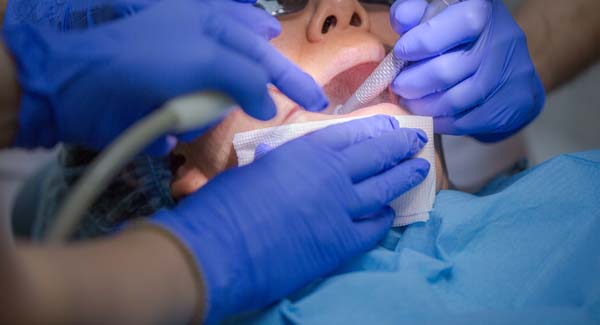Is a Dental Tongue Tie Treatment Necessary?

Dental tongue tie treatment offers many benefits, and it is necessary when tongue tie does not resolve itself naturally. It is helpful to understand how a biological dentist can treat tongue tie in the least invasive manner possible to decide if you should visit a dentist to see if treatment is right for you.
When to consider dental tongue tie treatment
Even though it is never a pleasant experience to hear that your child may need dental tongue tie treatment, you can help yourself and your child properly prepare by learning more about what to expect. The following is an overview of dental tongue tie treatment and when it is likely to be recommended by a dentist.
What is a dental tongue tie?
A dental tongue tie is a condition that limits the child’s ability to use their tongue. It involves excess connective tissue that essentially ties the tip of the tongue to the floor of the mouth. The condition occurs at birth, and many cases improve on their own after the tissue loosens. If the issue lingers, however, it can cause complications with eating, speaking and oral health. A biological dentist can assess the severity of a tongue tie and determine if treatment is necessary.
How is dental tongue tie treated?
The primary method of dental tongue tie treatment is a minor surgical procedure known as a frenectomy. Many dentists may utilize various tools and instruments to remove the tissue causing the tongue tie. Some minimally invasive dentists may utilize laser therapy to address the concern. With that said, not every child with tongue tie requires treatment. Some dentists may also wait and see if the symptoms affect the child’s ability to function or their oral health.
When is tongue tie treatment necessary?
Tongue tie treatment is necessary if the tissue that causes the tongue tie does not loosen on its own. The issue with tongue tie is that it does not allow the person to freely move their tongue. This can lead to the following problems:
- Trouble breastfeeding
- Difficulty eating
- Speach complications
- Increase the risk of cavities
- Uncomfortable feeling or discomfort
If one or more of these issues develop, or tongue tie does not go away after an extended period of time, treatment is likely necessary. Some parents may also opt for voluntary dental tongue tie treatment as well.
Who should I visit for tongue tie treatment?
A biological dentist can help you through the dental tongue tie treatment process. They differ from traditional dentists in that they take a more holistic view of treatment. Treatment from a biological dentist is often less invasive than treatment from a dentist who takes a more traditional approach.
Talk to a biological dentist about tongue tie treatment
Our team offers dental tongue tie treatment, and we encourage you to reach out if your child has tongue tie that has not improved on its own. We believe in taking a more holistic approach to treatment, and we almost always choose the least invasive treatment option possible.
Are you considering tongue tie treatment in the Gainesville area? Get more information at https://www.easydentalva.com.
Check out what others are saying about our services on Yelp: Read our Yelp reviews.
Related Posts
Children's oral health lays the foundation for a lifetime of healthy smiles. Pediatric dentists can promote proper oral and speech development by identifying and treating dental issues early on. Since these dental providers complete the training necessary to deliver tailored care for the needs of young patients, they are typically the best choice for children's…
Sedation dentistry offers a safe and effective solution for children who experience anxiety, fear, or difficulty remaining still during dental procedures. By creating a calm and stress-free environment, sedation dentistry allows pediatric dentists to complete necessary treatments while ensuring children remain comfortable. Understanding the types, benefits, and safety measures can help parents make informed decisions…
Infant dental care is critical to ensuring long-term oral health and should begin even before the first tooth appears. Establishing good habits early in a child's life helps prevent cavities, gum disease, and other dental issues as a child grows. Pediatric dentists recommend introducing oral hygiene routines during infancy to support healthy teeth and gums…
Cavity treatment for kids is a common concern for many parents, as dental decay remains a prevalent childhood health issue. Early intervention and proper care are essential for maintaining healthy teeth and preventing future problems. Partnering with a pediatric dentist can take some of the guesswork out of promoting your child's oral health. To start…

